Family holidays are opportunities to break from routine, relax and loosen the purse strings. This holiday was our first in eight years so it was well deserved, but despite not having any fresh travel experience, I didn’t think it’d be much of a challenge to continue our zero waste lives and still enjoy our holiday. After all, we were staying in the one location for two weeks and we weren’t travelling overseas. It would be a home away from home.
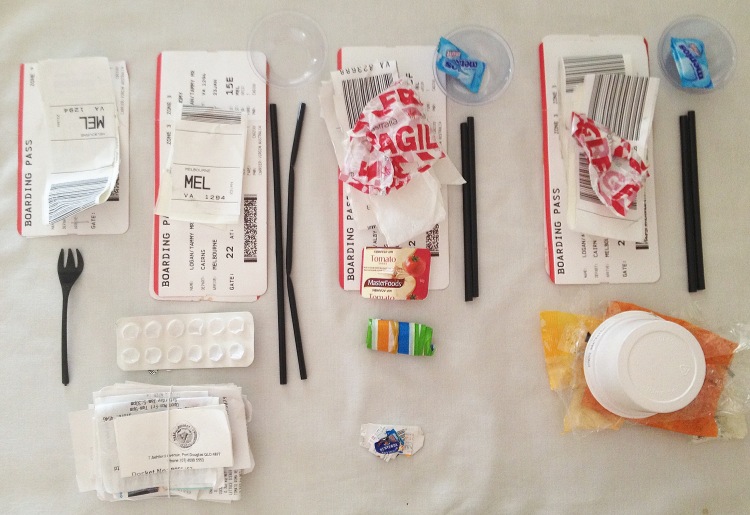
As it turns out, I was right. We succeeded in producing no more waste than we would have at home, but I did learn a few things from the experience. As well as being transported to a new location I had been transported back in time. Right from the start I felt the effects of unfamiliar people and places. Back home, I had forged relationships with businesses where they knew what I wanted and understood why. Zero waste shopping had become a pleasant experience. Now it was like I was back at week one with anxiety and fears of rejection. I suddenly realised I might not find a store willing to use my container, or one which wouldn’t automatically print receipts, or that I would have to put up with queer looks while I explained myself all over again. I hadn’t realised till then that I’d built up such a bank of information about businesses in my area. Thankfully my growing concern that this was not going to be a relaxing holiday was unfounded and we found plenty of places to get package free food – in fact, more options than at home! Probably due to the denser population.
Lesson 1: Starting out is the hardest part of plastic free and zero waste living. It gets easier over time and results in greater community connections.
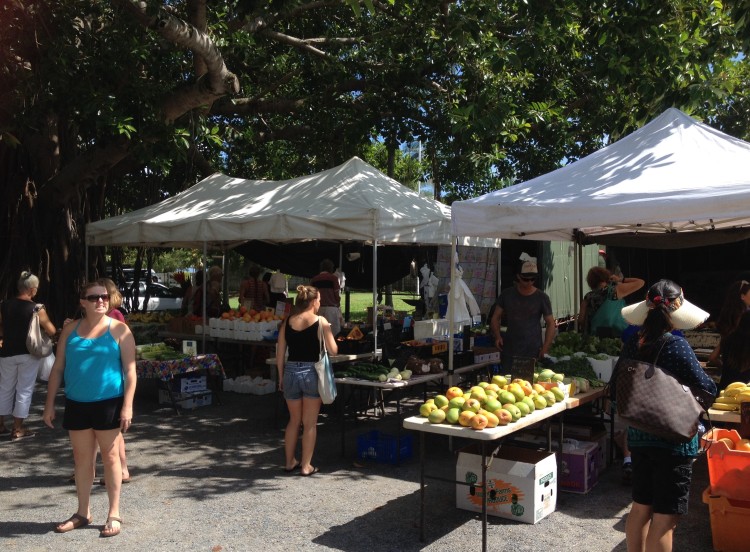
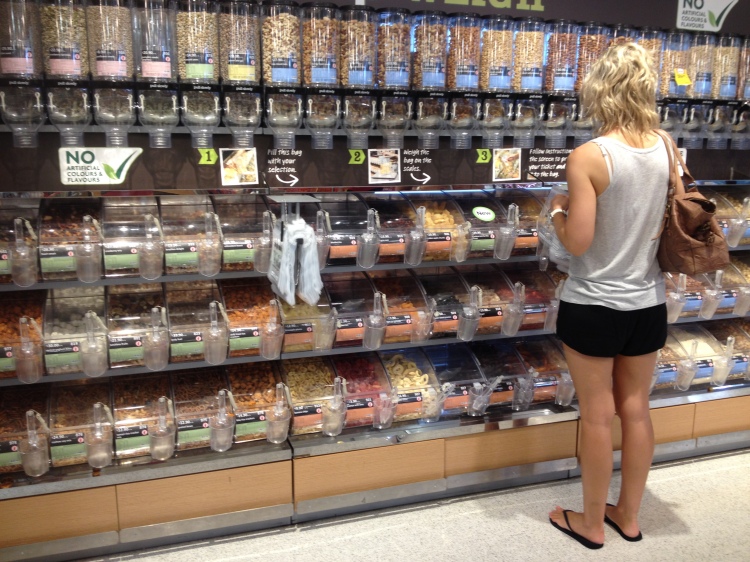

This holiday was my husband’s first opportunity to try out a lot of the things I do so our family can live plastic free. It’s also worth noting that he lives plastic free because it’s important to me, not because it’s important to him. I’ve got to say he handled it with ease and didn’t have any fear of rejection. I partially attribute his confidence to my example. But when he casually commented during a stroll along the street that “it’s actually pretty easy [to live plastic free], you just have to say ‘no’. No to the straw, no to the receipt, and no to the plastic bag,” I considered how easy it is for some people to say ‘no’ and how difficult it is for others.
Lesson 2: Leading by example works.
Lesson 3: Being able to say ‘no’ is a valuable skill.

Packing for our holiday wasn’t too hard. We made sure we had our reusable items like drink bottles, string bags, and a couple of containers. We also had our plastic free personal care and laundry items, and just the right amount of clothing. Shannon and I shared a bag but I let the kids have their own bags to give them some responsibility. It meant we ended up with more stickers than necessary.
Lesson 4: On board luggage doesn’t require stickers. Reduce the number of bags you check-in to reduce the number of stickers you get.
I have to admit our inexperience with flying meant that getting electronic boarding passes slipped by us and we ended up with boarding passes made from thermal paper. I don’t think thermal paper can be recycled.
Lesson 5: Electronic tickets are very common these days. Get electronic boarding passes.
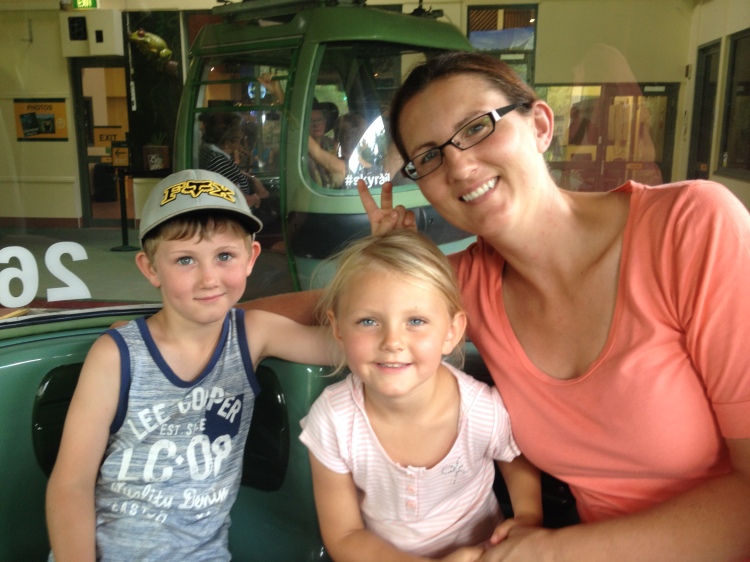
Thinking we were doing the right thing we refused our flight food which came in plastic. I asked if there was anything not in plastic and they said no. Since our holiday I have been told that our uneaten food would have been thrown out by the airline too. Whilst I don’t know if this is true, it does seem likely that they would. So, should we have eaten the food to prevent it from being wasted or was our stance against plastic worth it? Is there a better way to handle this situation? This was a domestic flight so we had our own food to eat instead; I imagine if we were flying overseas we’d have to eat the airline food.
Similarly, we stayed at the airport hotel the night before we flew so that we wouldn’t be travelling with tired children. When I mentioned on Instagram that we weren’t using the hotel toiletries to avoid plastic waste, a follower let me know that they get thrown out after our stay anyway. As we were already checking out when I got the message I asked the hotel staff if it were true and she said “oh yes, of course.” Again, I can see why they would do it but it’s so bloody frustrating! When we got to our resort I asked if they could take the toiletries out before we went into the room so there would be no concerns about tampering and they can be reused by someone else. At least I made the point that we were not happy with all the plastic.
Lesson 6: There’s not always a clear answer and it’s okay to make mistakes; it’s how we learn to do better.
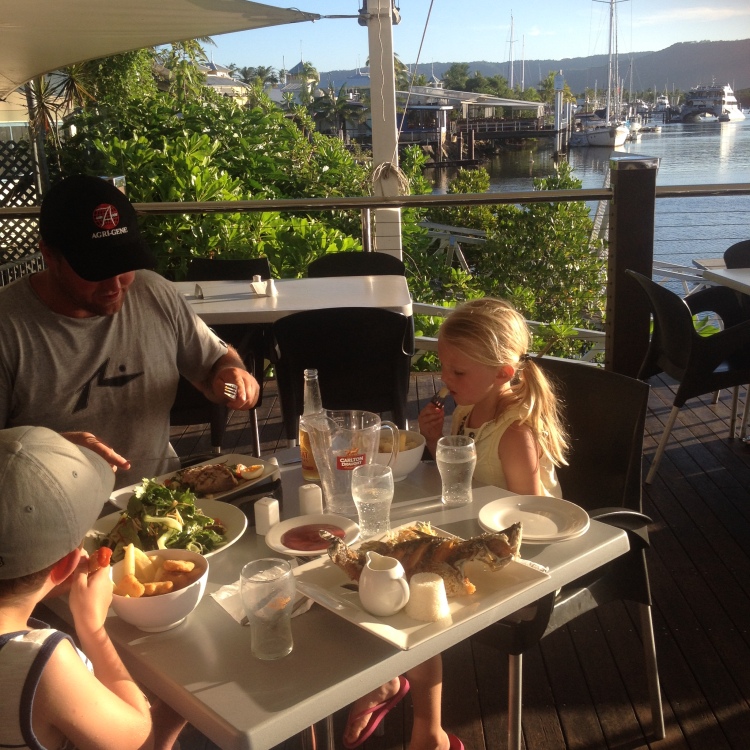
We mostly ate out but we cooked some meals at our apartment too. We definitely noticed an increased use of disposables like plastic ramekins compared to eating out at home. “No disposables” became part of our dietary requirements when ordering. We are really good at judging how much food we need so we only had leftovers twice which we took home in our small container to eat later. The only compostable waste we had was some fruit cores, pips, and peel. I decided it was acceptable to bury this in the resort garden but obviously this is not going to work on a large scale in the resort. I should have asked if they had composting facilities when I asked about their recycling situation. I couldn’t see recycling bins anywhere and we had accumulated a number of beer bottles. Luckily they did recycle.
Lesson 7: When in doubt find out. It always pays to ask.
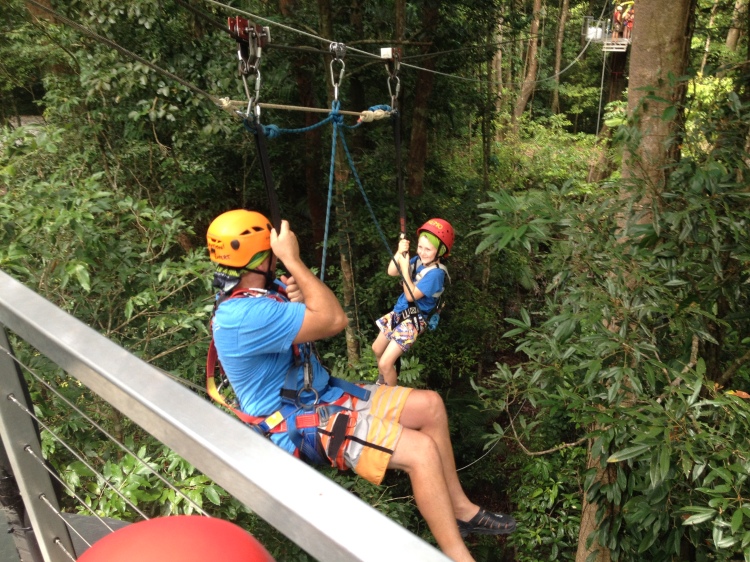
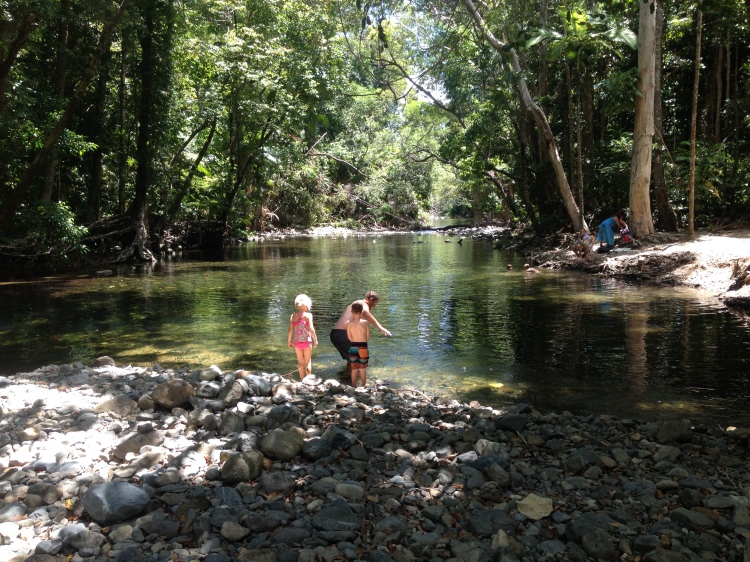
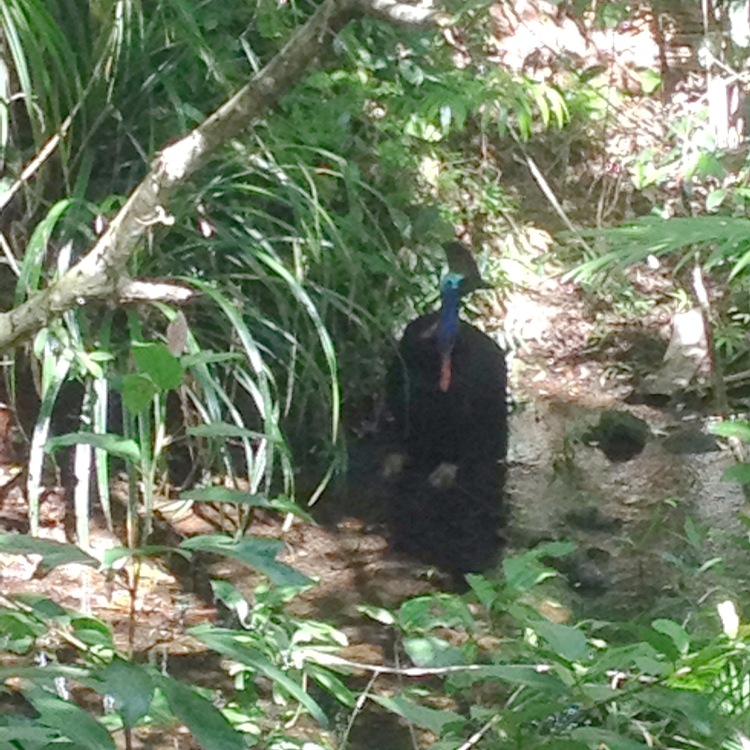
We had such a great time on our holiday and shared so many new experiences. We got to enjoy natural wonders like The Great Barrier Reef and Daintree Rainforest and just take it easy for the first time in a long time. We had the amazing experience of seeing a wild cassowary sit and drink in a stream a short distance from us. I whispered to a woman beside me who I had never spoken to before that “I can’t believe how lucky we have been on this trip” and her answer astounded me. She said “Nature knows. It knows that you bring your children to places like this to learn. It knows what you do and gives back”. I thought that was a beautiful thought.
Lesson 8: We really are a family that prefers experiences over stuff.
Lesson 9: Nature knows what you do.
If you have any sustainable holiday tips, please share them with me as we’ve promised ourselves we’ll make holidays an annual priority from now on.

Hey Tammy! Great post again, and some valuable lessons. Road trips and holidays have been a challenge to me from the start. I have learned lessons along the way (like prep is everything), but I’ve still got a ways to go. It helps to have a supportive network; it us difficult to travel with my sister, as she thinks my lifestyle is “obsessive and impossible” (at times she is even so spiteful to throw plastic out right in front of me).
That’s absurd about the hotel waste. What a crappy practice.
Glad you had a nice holiday! Just starting mine tomorrow!
LikeLiked by 1 person
Thanks Nadine! I have people in my life that like to tease and taunt me too. I hope you have a wonderful holiday!!
LikeLike
Thank you 🙂 I hope to find zero-waste gold like you did (regarding shops/stores). My first trip is to Vancouver Island; I know they have a large zero-waste presence there, and have very much “greened” their ways.
LikeLiked by 1 person
Hey Tammy! I’m participating in Plastic-free July and I am currently sitting at Dubai airport after a month around Europe. All I can say is it will be much easier when I get back to Melbourne!
It really opened my eyes to how much plastic waste there is in travel. We visited Greece and Turkey and the water there is not suitable for Aussies to drink, so they have bottled water everywhere! They actually do have loads of specific plastic bottle recycling stations but it’s impossible to avoid in public places. In some of the resorts we had filtered water that we could refil the bottles, but there was so many bottles everywhere! Airline food is another one. In future I’m going to see if we can say no-meal when we book or see if there is a way around it. Also plastic cutlery and straws we got given a lot of, luckily they were in plastic so we could return them. And we got the takeaway places to use tongs and give it to us without plastic wraps on the souvlakis. Very hard – need way more research next time! If anyone has any tips, I’d be eager to hear!
LikeLiked by 2 people
We just returned from 5 weeks touring Greece and Turkey and I was delighted to see that our tour company (Intrepid) tried to insist all the places we stayed at provided water refill stations. I nearly went berserk at the airline waste, (we travelled Qatar) it was ridiculous. I tried to book “no meals” as we can survive on nuts, fruits etc for that length of time but not available as an option. When you consider the number of flights around the world at any given time it just scares the daylights out of me.It’s even scarier that no one else on board seemed to mind. I follow a great blog that has loads of travel tips and hints for plastic free living, I think you’d like it! I got a few ideas from there before we left. http://plasticisrubbish.com/2016/07/02/lard-dripping/ I did learn that the crappy socks that comes in the silly little passenger ‘gift’ bag makes a great lens bag! Sounds like you had a great holiday 🙂
LikeLiked by 1 person
Thanks for all that Maree, I hadn’t thought of asking for no meal. Thanks for the link too. It’s scary to know there are so many people who don’t care about all this waste. I’m heading over to your blog to read more about your holiday 🙂 xx
LikeLiked by 1 person
Haven’t put up much about it yet! Trying to find the right thread in my head. 🙂
LikeLiked by 1 person
Sounds like an amazing trip Annelise, I’m jealous! I think you can get water bottles that have a built in treatment system so you can have clean water wherever you refill. I think they are expensive though. On hikes we boil the water so that might be an option in some locations. So many challenges but I guess we only need to work out the answer once. Asking for no meal is a good idea but based on Maree’s (fergi51) experience that doesn’t always work. All this talk of travel is getting me excited to plan the next trip. 🙂
LikeLike
I know this is a year late but we travel to SE Asia as a family every year and always take our Fil2pure water filter bottle. It’s the travel one that gets rid of all the nasties and we’ve never gotten sick (even in the Sumatran jungle!). Can be filled from any water source practically and then you just drink like you would from any sports bottle. Saves tons of water bottles ending up who knows where, not much recycling going in in a lot of developing countries.
LikeLiked by 1 person
Thanks Jacqueline, I’ll be sure to check this out if we ever need one.🙏🏻🙂
LikeLike
Hi Tammy. Great post. I have just returned from a year and a half in Asia and The Middle East on motorcycles. Plastic is the scourge of the world. We are so lucky here. You can take food on international flights and all flights as far as I know. When returning to Oz just make sure you don’t bring any food into the country.
Re the small toiletries, you can grab them and then offer them to other people who travel and camp. They are great for cycling, hiking etc and are reusable. I am pretty sure you can drop them off at op shops.
LikeLiked by 2 people
Thank you for these tips :). Sounds like you’ve had an amazing trip! I travelled a little bit before we had kids and I really miss it. We’re working our way towards more travel but I have dreams of taking the kids on a year long trip somewhere. I think it’s just a matter of us doing the planning and taking the plunge.
LikeLike
Oh Tammy, if you are tuned into plastics and other waste issues, you may be very, very, despondent. Especially in developing countries. It is truly at catastrophic levels. Sorry for the bad news!
LikeLiked by 2 people
I guess I know this but I think seeing it for myself might make me cry inside.
LikeLiked by 1 person
Not the brighter side, you should google Ziro, Arunachel Pradesh. I wrote about it on my blog. It is very inspiring for sustainability and is UNESCO listed for this.
LikeLiked by 1 person
We have signed up for plastic free July as well and have just returned from a couple of days staying at an Airbnb near Daylesford. We had to stop for petrol and I realised we had forgotten to bring our water bottles. Plastic was off the list so the options were tinned drinks – way too sweet – or a glass bottle which cost three times as much. We ended up buying the pricey one, kind of as a reminder that one must pay for such oversights. The challenge was on! We were pleased that Baker’s Delight in Daylesford were able to offer a paper bag option – unfortunately the organic store nearby had sold out of bread. Our biggest plastic dilemma became the plastic bags used for the wood we needed to keep the house warm. We brought all our waste home, partly to make sure it was all properly disposed of. Thanks for starting this discussion and for you insights into what you learnt on your travels. 😊
LikeLiked by 1 person
Well done Tammy & family – looks like a great holiday.
I put any thermal receipts I get in my worm farms and my worm farms are healthy, so nature seems to deal with it.
Bar staff are so used to finishing making a drink & automatically grab for a straw even if you have asked for NO Straw please. I pointed this out to staff recently and he immediately acknowledged my request and grabbed the straw from my drink and binned it, then readily agreed how wasteful plastic straw are as they just end up in landfill.
Plastic in many countries is atrocious, but historically, many of these used to have their organic material cleaned up by herds of sheep or goats that were herded or roamed through towns and parks or being organic it decomposed, so “rubbish” was not an issue. Today they don’t have the infrastructure to cater for non organic waste, but continue to dispose of things in the same manner eg. in the streets or water-ways, but it does not decompose and in the process also kills many animals whose gut gets full of plastic so that they either starve with no capacity left for nutritious food or because of plastic blocked stomachs/intestines. Yes, there are many beautiful places to visit Tammy, but many also will make you “cry inside”.
LikeLiked by 2 people
Are you concerned about the BPA on the thermal paper in the worm farm? I don’t know what the effects would be, if any. Really interesting what you say about cultures around the world disposing of waste. I came across a similar statement with regards to Aboriginals about a week ago and I’d love to read more about it if you have any other links you can share off the top of your head. Otherwise I’ll see what I can find. Thanks Tammy
LikeLike
Hi Nola, was not at all pleasant seeing all the plastic (and everything else!) in India being burned on the side of the roads. I will never forget that smell or the black smoke it exuded.
LikeLiked by 1 person
love this!, i know when i was cleaning rooms in motels that we didn’t discard unused soaps and shampoos etc! – (maybe we legally should have?- but we never wasted 🙂 i wanted to ask where you stayed, I’m wanting to book a family holiday very soon?
Thanks for being so inspiring ❤
LikeLiked by 2 people
Thanks Tessa. I’m glad to hear that. Maybe it depends on the place of accommodation. We stayed in Port Douglas at Rendezvous Resort, it was okay but we were expecting better.
LikeLike
Hi Tammy, Some airlines are changing the way they do things – Qantas is one (copy & place in browser): http://www.wastemanagementreview.com.au/qantas-sky-high-ambitions-for-airline-recycling/
Air NZ is another: http://www.airnewzealand.co.nz/assets/PDFs/J004845-Sustainability-Report-2015_FINAL-ART-NEW_MEDRES.pdf See P 19 for waste and 20 for uniform recycling, and
http://www.aviationbusiness.com.au/news/auckland-airport-halves-aircraft-cabin-landfill-waste
Haven’t checked for others.
LikeLiked by 3 people
Oh wonderful, thanks for sharing those Nola! I’ll be sure to properly research our airline options next time.
LikeLike
Hi. I noticed you didn’t say where that amazing store was. Obviously not near us but some readers might want to know or other travellers 😊
Its great to see you can keep it up while on holidays.
I wonder though, youre waste is bigger than what’s pictured yes? It’s just that you recycle or compost the other waste? So do you buy plastics if you are going to recycle them or do you try to avoid them altogether? Do you go to great lengths to have no plastic and only recycle what’s absolutely necessary? Or do you never have plastic? Sorry, I’m just trying to understand how it works.
I hate the plastics floating around the world. What’s your view on biodegradable plastics? The bandaids I’ve bought biodegrade within 18months. If it’s bio degrading, then it disappears…right? At least a better option?
LikeLiked by 1 person
Thanks for your great questions. Do you mean where the bulk wall was? That was in Coles in Port Douglas. The photo includes all our plastic as well as all our landfill. The compost I mention in the post is the only compost we had for that period of time, and as well as beer bottles our recycling included three cardboard boxes and a few bits of paper. The cleaning staff were stunned that all the bins were empty when they came in to service the room! My aim is to avoid single use plastic altogether but sometimes it finds its way into my house. I don’t use biodegradable plastic either as its not a good alternative. some of these plastics are not truly biodegradable. In some cases it may be helpful, but I haven’t heard of biodegradable bandaids before. Recycling is also not the answer because it is so energy intensive and we shouldn’t be wasting our resources the way we are in the first place. A really good post of mine for you to read where I answer most of these questions in depth is https://gippslandunwrapped.com/2016/03/13/3-guidelines-for-successful-plastic-free-and-zero-waste-living/
Let me know if you have any other questions and I’ll do my best to help. 🙂
LikeLike
Thank you. Those were my thoughts on it but I didn’t want to give myself unrealistic goals if the people I’m looking up to aren’t doing it iykwim. I will check out that post. Thanks
LikeLiked by 1 person
Totally understand. I was the same when I started 🙂
LikeLike
Great post again!
I know the feeling that you describe about not knowing the people, the shops etc…
I’m not sure if it works in Australia but here in Europe it is pretty easy to travel with low cost airlines and they don’t give you food at all, you can purchase if you want though.
If you want to check out how we did our family holiday, pls visit my blog: https://studiotimiko.wordpress.com/2016/06/16/eco-friendly-reduced-waste-summer-holiday/
Looking forward to your next post 🙂
LikeLiked by 1 person
Thanks Timi. Yours is a great post too, thanks for sharing that. I definitely need to give myself more time to evaluate our airline options next time; that’s a good idea. Xx
LikeLiked by 1 person
Hi Tammy,
I have loved following your posts. We just got back from a four week trip to Europe. We also tried our hardest to avoid all the disposable waste. Somethings were easy, other thinks not. We started with borrowing a lot of the cold weather clothes we would need from friends who had already been to the snow. So we saved money and packaging there. We only took a capsule wardrobe so everything we needed fitted into 2 large bags instead of having five bags needing tags. We stayed in mostly Airbnb vs hotels. So we were able to greatly reduce the amount of disposable plastic that way and save money by having breakfast and dinners at home. We packed our own morning teas in lunch box containers, made an effort with our lunches that we only ate at restaurants where food would be plated and have metal cutlery. We had taken a few containers with us and if we did happen to be caught short we would use them again the next days to go buy dinner or use as lunch boxes. Not ideal but at least we left them at the Airbnb so the next guest would have access to something to microwave or store left overs. Out of all the places, Amsterdam we found the best place to visit to help support our lifestyle. As a region devoted to being environmentally forward thinking everyone is so healthy riding their bikes around. They have dedicated bulk stores, a lot of the cutlery I observed at museums etc were biodegradable/ compostable. Paper plates used. They have great fresh fruit and vegetables without packaging. You could see along a lot of the streets they had communal garden beds. That sort of thing. I highly recommend as a place overseas to go to. A lot of people asked how we could afford to take our family of five overseas for that amount of time. But once you’ve started a lifestyle of saying no to a lot of excess needs in your life at home and are happy to borrow and use what friends are more than willing to lend you it becomes so easy to save. We continued our lifestyle overseas. No one missed out. We got to do some amazing things. Stopped the buying of unnecessary souvenirs. Everyone back home knew we weren’t buying anything for anyone. I bought a Christmas decoration from every place we visited for my tree back home and that was it. Able to transport them home in rolled up socks so I was able to say no to all the bubble wrap and packaging. Overseas travel is do able. You’ll still run into a bit of waste, people printing tickets before you can say no. But overall we did rather well.
LikeLiked by 1 person
Thank you Claire. That’s fantastic! Thank you for sharing your experience, you make some great points that can benefit other people too (I do like the idea of a Christmas tree decoration from each place). 👏🏻👏🏻 Yes, I think there will always be a little bit of waste but if we just keep doing all the things we can to reduce the majority of waste, we’ve made a big difference.
LikeLike
We have had similar experience and have learnt that you can choose to book a food free flight on some airlines ( short length trips) and talke your own sandwhiches botled water etc) ) Some airlines have reuseable plastic cups and containers but alas avoiding the food would not save anything in long haul flights. I even decided to drink the water and recycle the bottle myslef rather than worry it would be thrown out. Hotels vary so as you say its worth asking the question we stayed in a place that refilled the little shampoo bottles, i was impressed i had of course brought my own anyway. We filed a coconut with our compost and returned it to nature. Its funny that the easist at home compost is hardest when away. share waste can help if travelling in austraia. So glad you had a great holiday. ps i have slowly been concerting my husband.
LikeLiked by 1 person
Hi Kathy, Reading your comment just made me think that something I should do more of is tell businesses when I appreciate the environmental initiatives they’ve implemented- like the refilling of shampoo bottles that you mention. Hopefully it would encourage them to go further with new initiatives, and eventually lead to the normalisation of all this stuff.
I don’t think I knew about sharewaste when I was on this trip, but that’s a great idea to use it when on holidays!
LikeLike